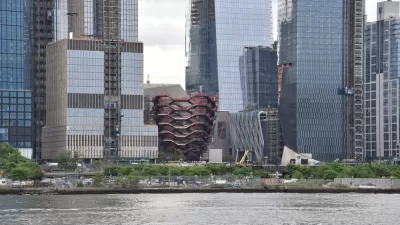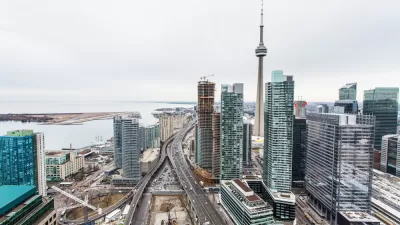Earlier in June, Google announced the creation of an "urban innovation company" called Sidewalk Labs. One writer explains the genesis of the company as well as its potential for the future of how cities operate.

Susie Cagle follows news about the launch of the Sidewalks Labs urban innovation company with context on Google's surprisingly complex history of dabbling in urban planning.
In essence, Cagle identifies Google's efforts to build a city within a city at the location of its headquarters in the Silicon Valley as a test run of the goals for Sidewalk Labs.
Google’s interest in the physical design and function of a city seems born of pragmatism (the necessary logistics of building and running its giant campus), with a vague tinge of eco-friendly progressive ethos. Those traffic jams bring the region to a halt every rush hour—how could a self-driving car make travel more efficient? Those parking lots for thousands of workers are really expensive—how do you get more of them to bike to work instead?
Cagle goes on to describe a dialectic behind the data-driven innovations of the privately owned tech industries with the political realities of the public sphere, in the process targeting Sidewalk Labs as the potential site for a future negotiation of how cities change.
FULL STORY: Google Is Planning to Plan Your City

Planetizen Federal Action Tracker
A weekly monitor of how Trump’s orders and actions are impacting planners and planning in America.

Map: Where Senate Republicans Want to Sell Your Public Lands
For public land advocates, the Senate Republicans’ proposal to sell millions of acres of public land in the West is “the biggest fight of their careers.”

Restaurant Patios Were a Pandemic Win — Why Were They so Hard to Keep?
Social distancing requirements and changes in travel patterns prompted cities to pilot new uses for street and sidewalk space. Then it got complicated.

Albuquerque Route 66 Motels Become Affordable Housing
A $4 million city fund is incentivizing developers to breathe new life into derelict midcentury motels.

DC Area County Eliminates Bus Fares
Montgomery County joins a growing trend of making transit free.

Platform Pilsner: Vancouver Transit Agency Releases... a Beer?
TransLink will receive a portion of every sale of the four-pack.
Urban Design for Planners 1: Software Tools
This six-course series explores essential urban design concepts using open source software and equips planners with the tools they need to participate fully in the urban design process.
Planning for Universal Design
Learn the tools for implementing Universal Design in planning regulations.
Heyer Gruel & Associates PA
JM Goldson LLC
Custer County Colorado
City of Camden Redevelopment Agency
City of Astoria
Transportation Research & Education Center (TREC) at Portland State University
Camden Redevelopment Agency
City of Claremont
Municipality of Princeton (NJ)





























